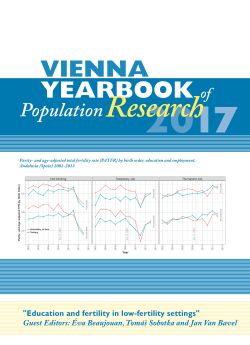
| ISSN | 1728-4414 |
| ISSN Online | 1728-5305 |
| ISBN-13 | 978-3-7001-8152-1 |
| ISBN-13 Online | 978-3-7001-8324-2 |
| Subject Area | Sociology and Economics |
| Quality review | refereed - online - print |
| doi | 10.1553/populationyearbook2017 |
Introduction

doi: 10.1553/populationyearbook2017s001
Demographic Debate

doi: 10.1553/populationyearbook2017s019

doi: 10.1553/populationyearbook2017s027

doi: 10.1553/populationyearbook2017s033

doi: 10.1553/populationyearbook2017s041

doi: 10.1553/populationyearbook2017s049

doi: 10.1553/populationyearbook2017s055
Review Article

page 063
doi: 10.1553/populationyearbook2017s063
Research Articles

doi: 10.1553/populationyearbook2017s095

doi: 10.1553/populationyearbook2017s121

doi: 10.1553/populationyearbook2017s143

doi: 10.1553/populationyearbook2017s181

doi: 10.1553/populationyearbook2017s215

doi: 10.1553/populationyearbook2017s239

doi: 10.1553/populationyearbook2017s269

doi: 10.1553/populationyearbook2017s293